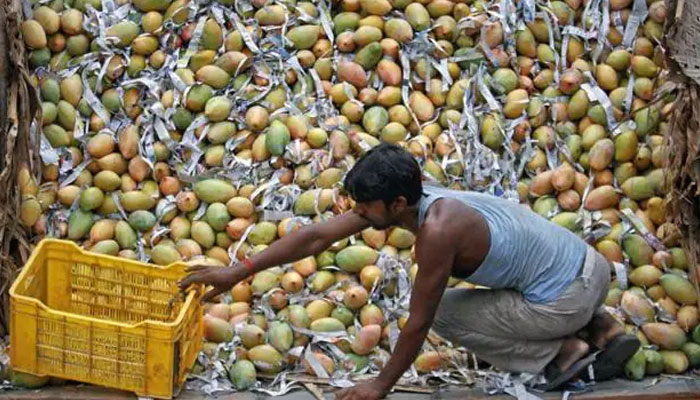Extreme weather conditions fuel fear of drop in wheat, mango production
Experts warn Pakistan may face 10% drop in domestic production of wheat and 30% cut in mangoes
May 12, 2022

- Experts warn Pakistan may face 10% drop in production of wheat, 30% cut in mangoes.
- "March 2022 was the warmest and driest month in the history of Pakistan," ex-PMD official says.
- Extremely hot conditions affect wheat and mango production — a major source of foreign exchange.
ISLAMABAD: Owing to “extraordinarily high temperatures”, water scarcity and other climate change-related events during the month of March and April this year, experts warned that Pakistan may face around 10% reduction in the domestic production of wheat as well as a 30% reduction in mangoes in Sindh, The News reported Thursday.
Pakistan Meteorological Department (PMD) former director-general Dr Ghulam Rasool said: “March 2022 was the warmest and driest month in the history of Pakistan. Due to extraordinarily high temperatures in this month, the wheat crop was badly affected and we may face at least a 10% reduction in wheat crop production this year.”
“Pakistan is facing extreme weather conditions for the last few years with extreme heatwaves to cloud bursts, prolonged droughts and urban flooding due to climate change,” experts said, advising the authorities to increase spending on climate change mitigation as the frequency of extreme weather events is likely to increase in the years to come.
PMD officials highlighted that the months of March and April 2022 were the ‘driest and hottest months in the history of Pakistan since 1961.
Read more: Temperature expected to soar up to 40°C in Karachi
They added that extremely hot and dry conditions affected agriculture, especially wheat and mango production, which is a major source of foreign exchange for the country.
“Due to extraordinary high temperature in the month of March, the grains of wheat could not complete their biological cycle and they shrank in size. The starch content in the wheat also reduces and this may result in at least 10% reduction in the wheat crop in the country,” Dr Rasool added.
It is worth mentioning that Pakistan is already facing a wheat crisis due to multiple factors including the war in Ukraine, which is the largest producer of wheat in the world. Pakistan’s wheat requirement is around 30 million tons but agriculturalists and authorities fear that country’s wheat production may not exceed 26 million tons due to extreme drought and ultra-high temperatures in the month of March 2022.
The former director-general said Pakistan need to initiate research on drought and heat resistant varieties of crops including wheat, rice and fruits as well as establishing large reservoirs of water as extreme weather conditions would continue to impact agriculture and overall life in the country.
Read more: Protecting Pakistan’s agriculture sector
Dr Rasool said: “Pakistan is one of the most affected countries due to climate change and we have witnessed that temperatures were extraordinarily high in the months of March and April this year.
“We need to work on climate change mitigation, the establishment of water reservoirs and development of heat and drought-resistant crops in Pakistan.”
He further added that due to the Russian invasion of Ukraine, which is the largest producer of wheat in the world, wheat cultivation could not be held and added that due to unchecked smuggling of wheat from Pakistan, the country could face a serious wheat and flour crises in the months ahead.
Same is the situation of mangoes production in Sindh, where extremely high temperature, less irrigation water and high-velocity winds damaged the production of mangoes, experts and growers said, adding that a 30% shortfall in the production of Sindhri variety of mangoes was feared this year.
Read more: Startups bringing Pakistan's farming into digital age
“In addition to water scarcity, we faced high temperatures in the month of March, due to which the biological cycle of the mango production was disturbed. When the fruits start developing in the month of April, we had extreme windstorms which caused production losses of around 5%,” Mansoor Ahmed Cheema, a mango grower in the Mirpurkhas region and member of Sindh Abadgaar Board told The News.
Cheema said he was not aware of the situation in the South Punjab belt but added that in Sindh, where the Sindhri variety of mangoes is produced, they feared at least a 30% reduction in the crop due to weather-related events.











